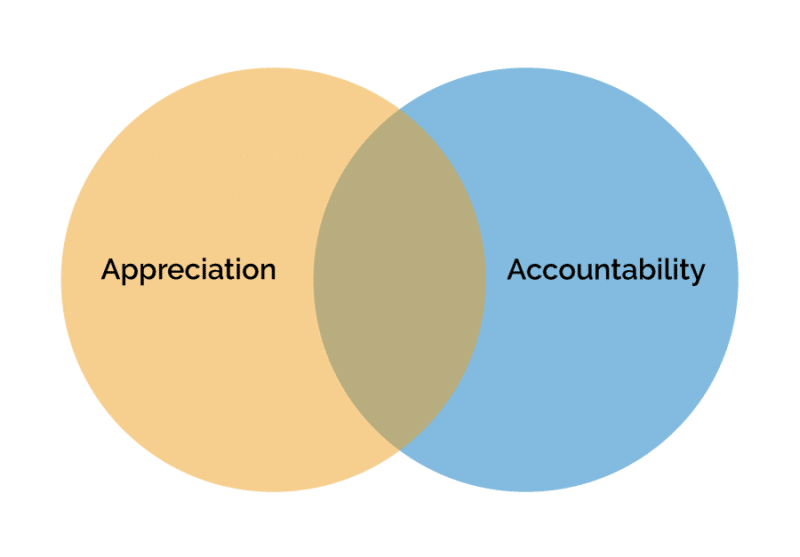Dear Fellow Leaders,
I know that many of you read my regular blogs to learn a few tips on how I believe we should lead our teams and our lives so that we are more fulfilled. But lately, I’ve been struggling a bit and am hoping you might be willing to share some advice.
As many of you know, I have a strong belief that it’s much better to be an uplifter than an energy sucker, and, I believe, we all prefer to surround ourselves with these types of folks. While I’m not perfect at it, I do strive to be a positive influence on my team’s lives. As such, lately I have been focusing on being intentional about appreciating everything in my life. I believe that by doing that, I will see more of the positive aspects of my teammates and be a better uplifting leader.
For my appreciation practice, I have been journaling about everything, from small to large. When I first started a couple of weeks ago, I had no idea where to start so I wrote down the first things that would come into my head. You’ll laugh, but it read, “I appreciate Microsoft Word’s spellcheck and this delicious Spindrift blackberry sparkling water I’m drinking”. I know … not very deep, but it was enough to get me started. As I continue, I am becoming more aware of and appreciative of other things, significant people, and opportunities in my life. As I spend time intentionally appreciating these things each day, in less than a week, I notice that I am enjoying life more, I am happier, and I laugh easier. I get more enjoyment from my friends, family, teammates, and even myself more. I see more of the best part of them (and me) and I more easily understand and empathize with them when they are having a rough day.
This is where I am running into a dilemma. While appreciating and focusing on the aspects of my teammates helps me see more positive things about them, what happens when they are not meeting their commitments?
I don’t have many rules here at Lighthouse, but I do have a few simple ones:
- Rule #1 – Every rule can be questioned here except Rule #1. In fact, it’s your responsibility.
- All you really need to know, you learned in kindergarten. – Robert Fulghum
- Your actions need to align with our corporate values of Integrity, Honesty, and Respect
How do I handle the dichotomy when someone I appreciate doesn’t deliver on our core values? I assume I’m not the only leader who has felt this conflict before, so I’m reaching out to hear your experiences and how you’ve resolved similar situations. Do I look past the problem? What if I address it once and something similar happens a second time? How do I balance appreciation with accountability? I would really appreciate your advice.
Thank you and, of course, keep having fun,
Jeff







Hey Jeff,
Nice article and congrats on the personal and professional self improvement. I regularly do appreciation exercises. I have found that finding the positives in people doesn’t negate the need to help them improve and grow from their shortcomings. Every business has people who don’t live up to the culture or the tasks. My suggestion is to be firm but fair in addressing areas of improvement. After all, if the company is always trying to improve its employees need to as well. Some can’t though. Over time, if not addressed, they become out of synch with the team.
Obviously, tools like annual reviews, weekly meetings, setting clear expectations, holding people accountable in real time, and using tools like Crucial Conversations can help.
Lastly, when offering constructive criticism, I always try ask myself these three questions; “Is what I am saying true? Is it kind? Is it necessary.”
David – I appreciate your words of wisdom. I think the “firm but fair” statement really does apply. It’s not always easy. I learned a lesson from one of our kids’ elementary school teachers when she told us that “Fair is not always equal.” I feel like that is a good lesson that I try to keep in mind as well.
I really like your last three questions too – “Is it true, is it kind, is it necessary”. Great thoughts!! Thank you.
I appreciate you,
Jeff
Hi Jeff,
I appreciate the topic and your dilemma! What I find works for me is continue to appreciate as often as possible but it is also important as a leader to call things out immediately and hold your team or resource accountable. This shows them you are very appreciative however this is not going to stop you from correcting bad behaviors. I’ve been told from several of my managers that they appreciate this about me. They appreciate me bringing things to their attention immediately so they can correct it if possible for future.
I worked for a manager one time that never gave me negative feedback at all and never addressed anything with me as far as opportunities I had to improve. I had less respect for this manager as I felt they were trying to avoid what could be a difficult discussion on their part or they just was not comfortable having those discussions at all.
Hope this helps as it has been my experience along the way!
Thanks,
Tami
Tami, hi. You hit the nail on the head with your thoughts about “Appreciate, but quickly call out bad behaviors.” As I read your response, it reminded me that we are not only helping improve/correct the person performing the bad behavior, but we are setting the example for our whole team. The team sees the same behavior and expects us (nay, needs us) to address it. If we don’t, they can easily feel disrespected.
Thank you for that reminder!! And, for your example of a former manager who never gave you any negative feedback. Great example!! Thank you.
I appreciate you,
Jeff
Great thoughts, Jeff. People don’t want to underperform. It’s exhausting to disappoint a boss or customer. But getting to the truth can be hard. People tend to protect their reputation and income when it feels at risk. Disarming a talk while protecting the business at the same time can feel impossible.
I find saving a poor performer means leading with curiosity. Asking someone how they feel about their commitments leads to more self-accountability.
Whether lenient or lofty, no organization is without conditions. When it doesn’t work, a leader can be grateful even in a termination. You can thank someone when you fire them. I’ve done it.
Aaron, hi
Thank you for your thoughts. The one that resonated the most with me was your reminder to lead with curiosity, but it really needs to be sincere curiosity. It cannot be a setup question like so many of us are taught like “Can you help me? I need a little coaching … ” when all they want is to soften the blow as they explain how I screwed something up. Your approach aligns well with Stephen Covey’s “Seek first to understand”.
With your idea of curiosity and David’s of kindness, that feels like a winning combination. Again, thank you for sharing your thoughts and experiences.
I appreciate you,
Jeff
Jeff,
There’s a lot to this topic and situations may vary. But I find that you have to first build trust within your team as the foundation. It’s not always easy, and takes time. But once that is established, I typically don’t have to dance around this. Real example is I have an engineering team in another country. I visit multiple times a year (well, at least pre-COVID!) and I stay a week at a time, not just pop in for a meeting. Recently, I received a complaint about another manager making some harsh & constantly demanding comments to the team. When I thought about that, I realized that I’m more demanding on the team than his comments were. So I asked them them honestly why they weren’t calling me out, or if they were behind my back. Their response was interesting – they said no, because I’ve taken the time to get to know them as people, their culture, and understand the language barrier so they trust me and know what when I’m demanding it’s for their benefit to get better. That being said, I also recognize them frequently and call out their accomplishments. And I also never take credit for something someone else does. But it’s a fairly easy balance to maintain once you build up the trust – don’t underestimate that!
-Brad
Thank you for your comments. I really appreciate your thoughts about building trust first. A long time ago, I attended a seminar on trust and I still recall the conversation about thinking about trust like money in your bank account. You need to make sure that you built up enough in there so that when you need to make a withdrawal, there’s still trust left. Although you didn’t say it explicitly, you are visiting them multiple times per year. So, you are continually building up that trust. I like that and I think we all too often begin to take our teammates, friends, and family for granted. I hear you saying that we need to spend quality time with them — all of them. Get to know them and let them get to know you. Thanks!